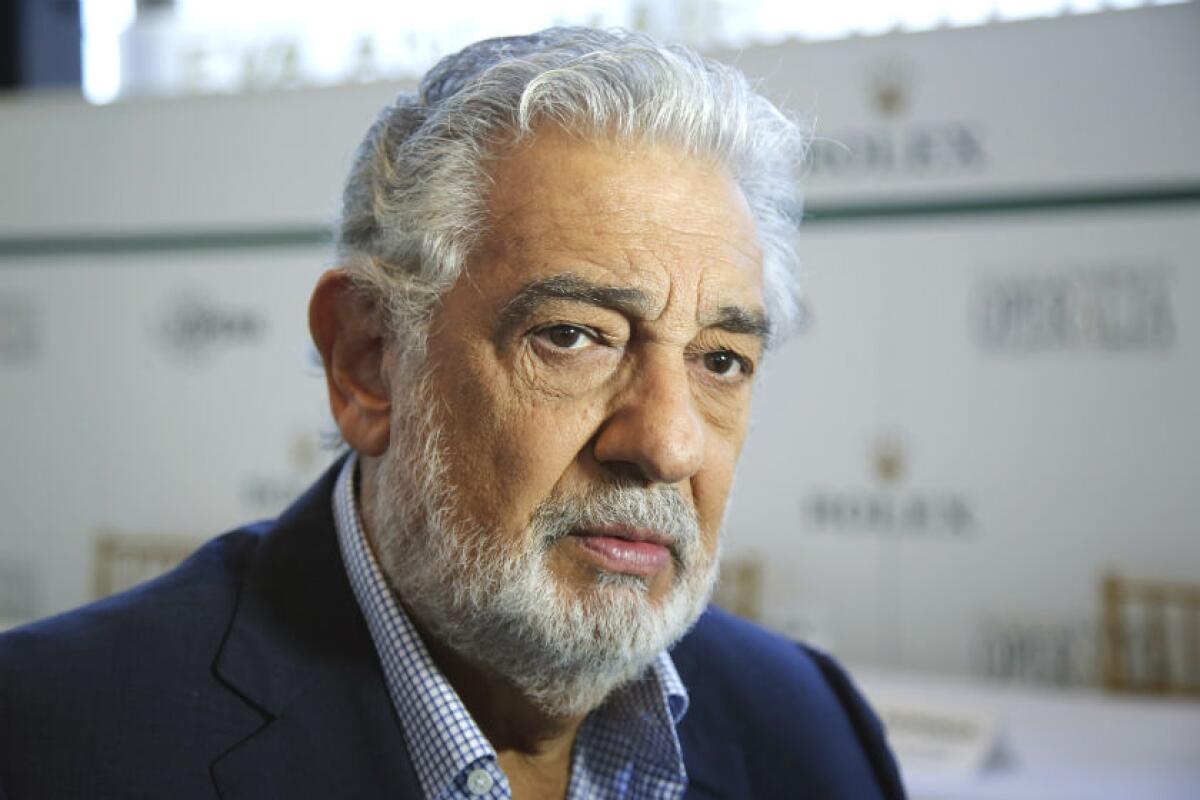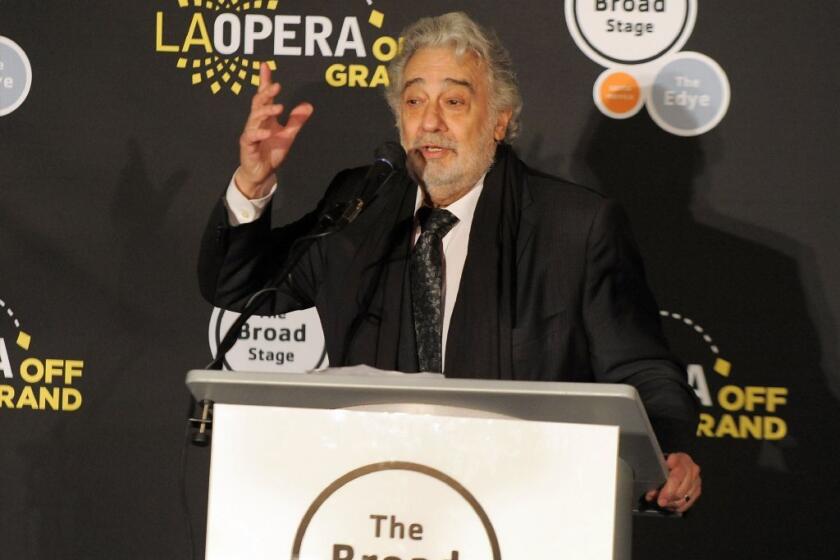Plácido Domingo withdraws from the Met. Will this be the script for the L.A. Opera?

Embattled singer Plácido Domingo on Tuesday pulled out of the Metropolitan Opera’s production of “Macbeth” barely 24 hours before the curtain was to rise in New York, reigniting questions about whether he will resign as Los Angeles Opera general director and if the star’s career in the United States is already effectively over.
Domingo’s appearance Wednesday was to be his first in the U.S. since the Associated Press published reports in which two named sources and 18 anonymous women accused Domingo of sexual harassment. The language of the Met’s announcement implied that the company had asked Domingo to step back.
“The Metropolitan Opera confirms that Plácido Domingo has agreed to withdraw from all future performances at the Met, effective immediately,” the statement read. “The Met and Mr. Domingo are in agreement that he needed to step down. The Met has no further comment at this time.”
Domingo responded in a statement to the New York Times, noting that he has sung at the Met for 51 consecutive years. “While I strongly dispute recent allegations made about me, and I am concerned about a climate in which people are condemned without due process, upon reflection I believe that my appearance in this production of ‘Macbeth’ would distract from the hard work of my colleagues both onstage and behind the scenes,” he said. “As a result, I have asked to withdraw and I thank the leadership of the Met for graciously granting my request.”
He expressed happiness that “at the age of 78, I was able to sing the wonderful title role in the dress rehearsal of ‘Macbeth,’ which I consider my last performance on the Met stage. I am grateful to God and the public for what they have allowed me to accomplish here at the Metropolitan Opera.”
The last-minute reversal came after a contentious weekend at the world’s largest repertory opera house. Although the Met previously had said it would await the outcome of an L.A. Opera investigation of the harassment allegations before taking any action, pressure peaked over the weekend following an NPR report that said Met General Manager Peter Gelb held a closed-door meeting with employees Saturday. Gelb reportedly told employees that the Met was not canceling Domingo’s performances because the allegations first reported in two AP articles could not be corroborated.
“Plácido Domingo is a huge cash cow, and, sometimes, I feel like management cares more about money and reputation,” a female chorister told NPR. “What if these accusations turn out to be true, or if there’s legal action against Maestro Domingo? I feel that Peter Gelb is saying, ‘I don’t have a problem exposing my artists to such situations.’ ”
Domingo had sung in rehearsals, and the Met said as late as Monday that he would perform. By Tuesday afternoon, however, the Met’s website had been scrubbed of all mentions of Domingo in “Macbeth,” instead advertising that baritone Zeljko Lucic — originally scheduled to alternate with Domingo — would star in all performances.
The casting change staves off the likelihood of a protest or the possibility of a disruption in the 3,800-seat venue where memories still linger from 2014, when John Adams’ “The Death of Klinghoffer” was interrupted twice by protesters who considered the opera to be anti-Semitic. Several hundred people gathered outside to voice their anger at the Met for that production.
With Simon Woods out at the L.A. Phil and L.A. Opera investigating Plácido Domingo, it’s time to look at companies’ No. 2s, stars of a new generation.
Despite the Domingo accusations — or perhaps because of them — the singer was greeted with adoration when he performed in Austria this summer. When L.A. Opera opened its 34th season this month with a punkish production of Puccini’s “La Bohème,” the performance and, later, the ball that followed under the stars on the newly renovated Music Center Plaza unfolded sans protest. The night, in fact, was most notable for what it lacked: any mention of Domingo.
The program contained no traditional welcome note from the general manager, there was no sight of Domingo before or after the performance, and there was not a single mention of his name during official comments at the ball afterward.
Los Angeles Opera did not respond to a Times request for comment Tuesday as two investigations proceeded. In the first, L.A. Opera hired investigator Debra Wong Yang of the law firm Gibson, Dunn & Crutcher. Yang recently sent a letter to L.A. Opera contractors and employees, inviting them to speak out about harassment and promising that the company would prohibit retaliation against “anyone participating in an investigation in good faith.”
The second investigation is being conducted by the American Guild of Musical Artists, a union that represents members at the Met and L.A. Opera.
Len Egert, AGMA’s national executive director, told The Times on Tuesday that the union’s investigation will take two to three months. He would not comment on specifics of the inquiry.
“AGMA has been in regular communication with artists and union leaders at affected locations, including Los Angeles Opera and Metropolitan Opera,” Egert wrote in an email. “We have encouraged our members to come to the union as a resource to redress and eliminate sexual harassment in the workplace.”
He added that L.A. Opera recently asked AGMA to provide information and resources to prevent harassment and discrimination. In response to that request, AGMA held a forum at the Music Center on Monday to discuss forms of harassment and to offer bystander training for those witnessing harassment. It also made counseling available for targets of harassment.
After the Met’s announcement Tuesday, a lawyer for Patricia Wulf, a mezzo-soprano who went public with her sexual harassment allegations against Domingo, released a letter she sent to Gelb.
“It appears that while the pain and indignity of more than 20 women who were sexually harassed by Mr. Domingo was not enough for the Met to do the right thing, the public outcry was,” wrote the lawyer, Debra S. Katz.
Of the women who have accused Domingo of harassment, Katz added, referencing earlier Gelb comments: “They deserve the public and the arts world’s respect and appreciation — and not the type of victim shaming your statement reinforced.”
More to Read
The biggest entertainment stories
Get our big stories about Hollywood, film, television, music, arts, culture and more right in your inbox as soon as they publish.
You may occasionally receive promotional content from the Los Angeles Times.












